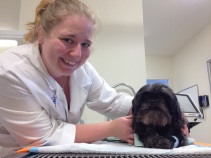Vaccination Protocol
Rabies vaccine: This vaccine is critical to protect your pet and family. Rabies is a deadly disease that is contracted through the saliva of an infected animal. Bats are the most common carriers of rabies in Illinois and can get into your house. Therefore, every cat and dog should receive his or her first rabies vaccine at 16 weeks, a year later, and then revaccinate every 3 years.
Canine Distemper/Parvo complex: This vaccine actually protects against several severe diseases (canine distemper, parvovirus, adenovirus type 2, and parainfluenza). These diseases are very contagious to other dogs and some can linger in the environment for months. Puppies should receive booster vaccines at 8 weeks, 12 weeks, and 16 weeks. After that, adult dogs are vaccinated every 3 years. A blood test (titer) can be performed to determine if your dog has adequate protection and does not need the vaccine.
Feline distemper complex: This vaccine actually protects against several severe diseases (Feline Panleukopenia Virus (also called feline distemper), Calicivirus, and Feline Viral Rhinotracheitis). These diseases are very contagious to other cats. Kittens should receive booster vaccines at 8 weeks, 12 weeks, and 16 weeks. After that, adult cats are vaccinated every 3 years. A blood test (titer) can be performed to determine if your cat has adequate protection and does not need the vaccine.
Lepto vaccine: This vaccine protects against Leptospirosis, bacteria that is transmitted through the environment. It can cause kidney or liver failure in dogs. It can also be transmitted to humans causing severe disease in them. There are several strains of Lepto bacteria and the newest vaccine protects against the strains we see in Illinois. A puppy or dog that has never had this vaccine before needs two booster vaccines 2-3 weeks apart. After that, adult dogs are vaccinated every year. Cats can also get this disease but it is rare and there are no vaccines available for cats. The vaccine has not shown protection beyond 12 months so titers are not recommended.
Bordetella vaccine: This vaccine protects against the most common bacteria that cause "Kennel Cough". Kennel cough is a highly contagious respiratory disease that can cause coughing, nasal discharge, eye discharge, and occasionally pneumonia. This disease is more common in dogs than cats. Your dog should be vaccinated every 6 to 12 months if he or she goes to dog parks, boarding facilities, or grooming facilities. The distemper/parvo complex that dogs receive protects against two other organisms that can cause kennel cough.
Feline Leukemia vaccine: This vaccine helps protect against Feline Leukemia Virus, a virus in cats that can result in decreased immune system and malignant cancer. It is spread through direct cat-to-cat contact by their saliva (during grooming or playing) or blood (during fighting). We advise testing every kitten and new cat. Every kitten needs two booster vaccines 3-4 weeks apart. Cats that are negative and will be indoor only, are at a very low risk of getting the disease. Therefore, we advise not to continue to vaccinate. However, if your cat will be going outdoors, we advise keeping your cat up to date with this vaccine. After their boosters, adult cats are vaccinated every 3 years. A feline leukemia test should be performed prior to starting the vaccine since the vaccine may cause a test to be positive.







